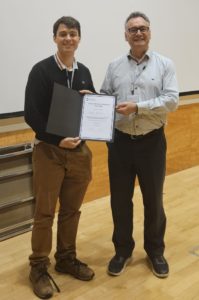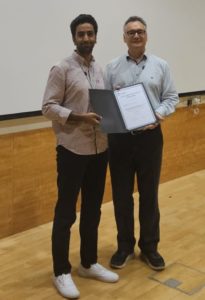Congratulations to the poster prize winners at the Cambridge Bioelectronics Symposium held on 1-3 July 2024 in Cambridge, UK. Ahmed Omara won the Journal of Materials Chemistry B award, while Joseph Asfouri won the Journal of Materials Chemistry C award.
Ahmed Omara, Leibniz Institute for Polymer Research Dresden
Poster title: Hydrogel-Functionalized Microelectrode Arrays (MEAs) for Multimodal Cell Stimulation
Biography: Ahmed Omara, originally from Egypt, holds a bachelor’s degree in mechanical engineering with a double concentration in material science and mechatronics, and a minor in economics from the American University in Cairo, graduating in 2015. He pursued an Erasmus Mundus master’s program in nanoscience and nanotechnology, spending the first year in Belgium and the second in Barcelona, Spain. Specializing in nanomaterials, he discovered a passion for biomaterials, hydrogels, tissue engineering, and electronics.
After his masters Ahmed returned to Egypt in 2021 where he worked as a lead scientist to create biodegradable plastics from natural sources at Sadko group of companies. Currently, he is pursuing a PhD at the Leibniz Institute for Polymer Research in Dresden, Germany, focusing on fabricating bioelectronic devices and functionalizing them with hydrogel for multimodal cell simulation at a single-cell resolution level.
Joseph Asfouri, University of Cambridge
 Poster title: Towards a 3D, Flexible, Biohybrid Device for Cell Replacement Therapy for Parkinson’s Disease
Poster title: Towards a 3D, Flexible, Biohybrid Device for Cell Replacement Therapy for Parkinson’s Disease
Biography: Joseph is a master’s student in George Malliaras’ lab at the University of Cambridge. During his undergraduate years at Rice University, he studied electrical engineering and neuroscience while conducting research on magnetogenetic neural stimulation at Rice, deep brain stimulation for depression at Baylor College of Medicine, and brain-computer interfaces for motor prostheses at the University of Washington. At Cambridge, he designed a novel bioelectronic implant to enhance stem cell therapy for Parkinson’s disease. Along with his passion for neural engineering, his interests include science policy and commercialization to translate neurotechnology safely and efficiently from the lab to the clinic. This fall, Joseph will return to the US to start his PhD in the UC Berkeley-UCSF Joint Bioengineering Program.











